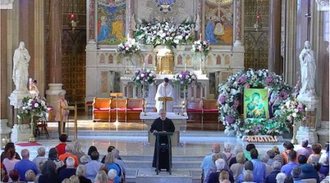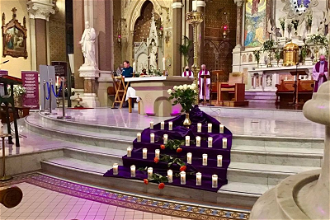Clonard: Annual Novena highlights the importance of compassion

Wednesday 19th June 2024 was the first day of Clonard Monastery's annual Novena in honour of Our Mother of Perpetual Help. Fr Ciarán O'Callaghan C.Ss.R gave a warm cead mile failte to all of those in attendance in West Belfast and online via www.Clonard.com
In his homily, Fr Ciarán referred to the first reading of the Novena, in which God spoke through His prophet Jeremiah of His care for humanity.
Fr Ciarán remarked that in the English text, God says, 'I am deeply moved for humanity', but if you go back to the original text in Hebrew - which uses poetic forms - what's written there is something different: 'My womb trembles for humanity.' Fr Ciarán said that it was a feminine image of God and an amazingly powerful statement about God's compassion for us.
Referring to the Gospel reading for the first day of the Novena, Fr Ciarán explained that Mark tells us 'Jesus had compassion for the people' because they were like sheep without a shepherd. But in Greek, Mark's original text said something more powerful: that Jesus 'felt for the people in his guts, in his intestines'. In Jesus' day the womb was considered to be the organ of compassion for women, and for men it was the intestines. So both of the readings chosen for the first day of the Novena were using expressive language to communicate to us God's compassion for suffering humanity.
Fr Ciarán went on to say that in Jesus' day, just as in ours, there were hungry people, immigrants, people without clothing, sick people, prisoners. Jesus didn't speak fancy, vague words about justice. He spoke very explicitly about practical care; He spoke about food, clothing, something to drink, protection from the elements. When He called on His disciples to show compassion, He called on them to do very practical, specific things, like giving, welcoming, visiting and taking care of. And Jesus went further, and scandalised people and the religious authorities in doing so: He said the pathway to God is not necessarily through religion, nor through worship, nor through the confession of faith. He said that the path to God is through compassion for the suffering, the vulnerable and the excluded.
Fr Ciarán went on to ask what is a discipleship of compassion? What is that like? He explained that if you can recognize people are suffering - be they migrants or whoever - and if you can, as it were, stand in their shoes, look with their eyes, and see the reality of what they are experiencing, and if you can feel for them in the pit of your stomach, and if you want to do something to change or help, then you are a disciple who understand why God's womb trembles and Jesus' guts churn.
Fr Ciarán added that, for Jesus, the ugliest sin of all was a failure of compassion towards others, or any kind of indifference towards the suffering of others. That's why He was very explicit with his disciples, and with us, when He said, 'Be compassionate as your heavenly Father is compassionate.'
Fr Ciarán said that in saying that, Jesus told His disciples back then, and tells us now, what He wants of us, His followers. He wants us to introduce compassion into all of human life; a womb-trembling compassion like God's. We are to look with compassion on all, particularly the suffering, the vulnerable, the excluded. We are to feel for them in our innards. We are to plant compassion in all our relationships. And we are to live compassion in every way possible. And in saying this to us, Jesus is reminding us that compassion is God's way of being - that God's womb-like, intestinal compassion is for all, but most of all for the excluded - and that compassion is the way to imitate God and to be holy as God is.
Fr Ciarán ended his sermon with the words, 'To look on people with compassionate love is to be like God. And to help the suffering with compassionate love is to act like God.'

















